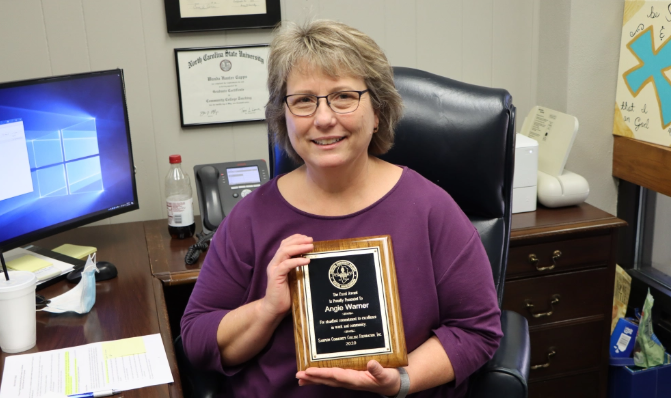When he took over as Director of Basic Law Enforcement Training (BLET) at Sampson Community College, Anthony Davis hoped to instill more than skills training and knowledge of local government. Davis intended for graduates of the BLET program to leave having learned to exemplify the core values of the program: Professionalism, Humility, and Integrity. In the past two years, BLET graduating classes have achieved 100 percent passing rates on the state licensure exam.
Davis says that he — and his instructors— intend for the recent success of the BLET program to trickle down into students’ future careers.
“There has been a lot of emphasis put on student development within the program, personally and professionally,” Davis stated. “Not only do we want the recruits to succeed during the BLET Academy, but we also want to see the student succeed in their career after graduation.”
From the beginning, the model for this program intended for students to have ownership in the class. Instructors put rules in place that are heavily enforced, and students appoint class leaders. This structure ultimately allows students to create an environment where they thrive. The program’s core values, Professionalism, Humility, and Integrity, are emphasized as frequently as the classroom content.
Qualified Assistant, Robert Stroud, believes that this class model is a major contribution to students’ success over the years. Instructors set individual goals for students, test scores are closely monitored, and weaknesses are identified so that they can be reviewed and refocused. Stroud says instructors use interactive programs and traditional testing methods.
“We have implemented many changes. These changes challenge each student to perform at their very best,” Stroud commented. “The system that we have put into place with testing and to challenge each student to keep focused has been a driving force to be able to say that we prepare them for the certification process.”
Since Davis and Stroud took over the program, every student who has taken the state exam has received his/her certification. That exam tests students on topics related to Legal, Patrol Duties, Law Enforcement Communication, Investigations, Practical Application, and Sheriff Specific.

Left to right: Stephen Cannady, Ryan Mitchell, Camden Gunter, Brandon Fann
Students from the recent group of graduates echoed Davis and Stroud’s thoughts — the close camaraderie created in the program pushes students to succeed.
“The physical exercises and practical applications were difficult in a lot of cases, which forced us to rely on each other. Having to know each other’s knowledge in strong points and weak points was helpful in getting past some of those obstacles, along with laughing through things that were physically and mentally demanding,” Ryan Mitchell shared.
Stroud says seeing a group’s friendship grow over time is typical. Instructors tend to adhere to strict professionalism as a way of teaching the rank-and-file system of law enforcement but say watching the class encourage one another is admirable. Students expect that encouragement to continue as they head into local law enforcement and say they hope to see each other on the job.
“We have a friendship that will last long after the BLET course,” Stephen Cannady shared. “We are still in a group chat together and continue to talk to each other and are eager to see each other working patrol.”
As these four students begin to pursue careers in law enforcement, Davis knows that the truest measure of success will be the report he hears back from the agencies who hire these students.
“Having a department head call and tell you that your academy staff did a great job preparing the student for the real-world application of law enforcement speaks volumes to the level of commitment of the instructors and all those that support the BLET program. I’ll take that any day of the week,” Davis remarked.
To enroll in Basic Law Enforcement Training at Sampson Community College, students must be 20 years old by the date of the state exam. Visit sampsoncc.edu/blet if you are interested!
About Sampson Community College: Sampson Community College is a member of the North Carolina Community College System, located in Clinton, NC in Sampson County. The college offers many programs to include two-year degrees, college transfer, continuing education and workforce development options, and early college education.

